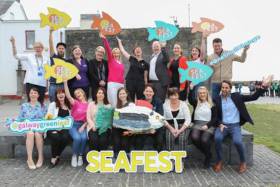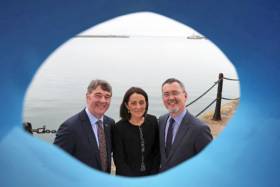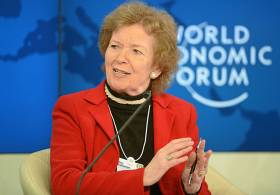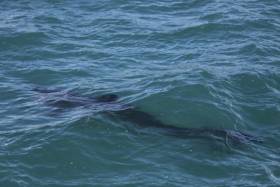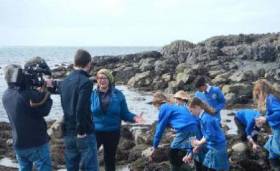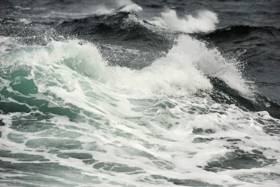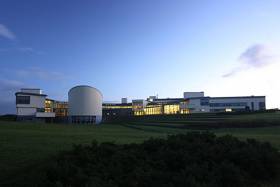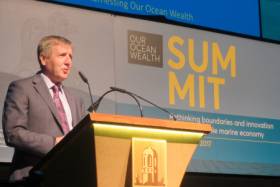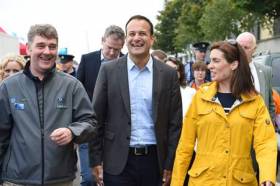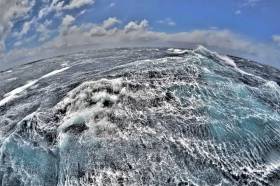Displaying items by tag: Our Ocean Wealth
#SeaFest - Businesses across Galway are saying ‘No to Plastic’ in our oceans to support SeaFest, Ireland's national maritime festival, taking place in Galway Harbour from Friday 29 June to Sunday 1 July.
This year, the festival aims to highlight the impact of plastics in our oceans, with a particular focus on reducing single-use plastics on the festival site.
The initiative is organised by the Marine Institute, in conjunction with Galway City Council’s European Green Leaf programme.
“A truck load of plastic waste finds its way into the ocean every minute of every day, and it's estimated that by 2050 there could be more plastic by weight than fish in the ocean unless behaviours change,” said Marine Institute chief executive Dr Peter Heffernan.
“I applaud the businesses of Galway that are supporting SeaFest, and have committed to reducing single-use plastics by offering alternatives for customers. These small changes can result in big impacts, which will encourage a change in behaviours long after the festival weekend.”
Arlene Finn, European Green Leaf co-ordinator with Galway City Council, added: “We can all find a way to use less ‘single use’ plastic, and I congratulate the SeaFest supporters for taking the initiative.
“CPL Recruitment have provided all staff with re-useable water bottles and water filters to minimise bottled water waste. Celestica are banning disposable cups from the site and giving free travel mugs to employees. Food For Thought and 56 Central have moved away from plastic straws, providing biodegradable options instead. Brazo Coffee Academy have signed up for ReCupán and Refill.ie to support customers who use reusable coffee cups and water bottles.
“We welcome more businesses to come on board with this initiative, and hope they will take inspiration from those already involved.”
Other supporters of this initiative include Galway City Museum, Galway Atlantaquaira, Food For Thought, Honest Kitchen, Irish Greyhound Board, Junior Chamber of Commerce, Temple Café, The Yield Lab Europe, The Heron’s Rest, Tropical Medical Bureau, Glenville Nutrition, Galway Convention Bureau, Bank of Ireland Galway and AMACH! LGBT Galway/Teach Solais Resource Centre.
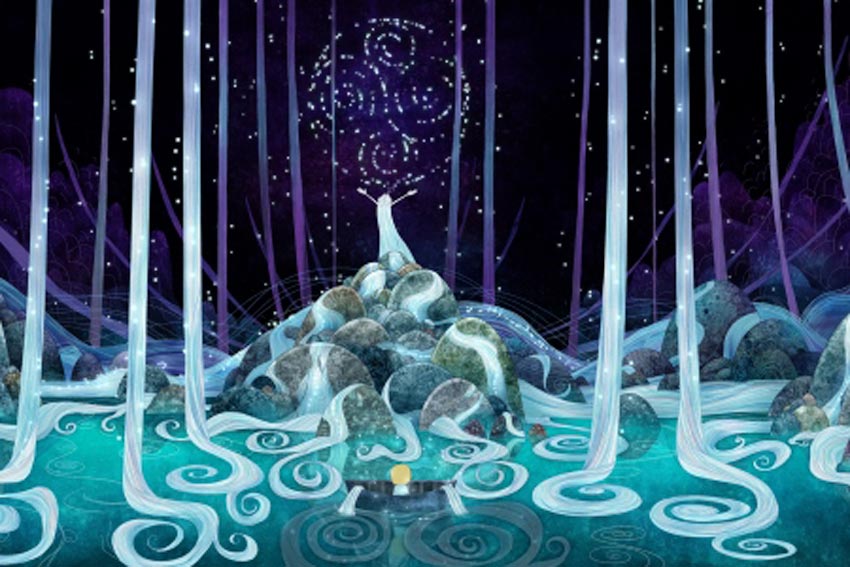 A still from Cartoon Saloon’s Song of the Sea
A still from Cartoon Saloon’s Song of the Sea
Meanwhile, a mesmerising cinematic experience will showcase some of the best ocean-inspired films and talks at SeaFest 2018.
The Atlantic Theatre will host free talks from renowned cameraman Doug Allan, as well as screenings of the documentary Ireland’s Deep Atlantic and children’s animation Song of the Sea.
A purpose-built marquee to accommodate 500 people will be erected at Galway Docks to create the Atlantic Theatre.
“We are delighted to be able to host seven talks from the renowned Doug Allan, all completely free to SeaFest visitors,” said Caroline Bocquel, Marine Institute director of corporate services. “His shows have been known to sell-out quickly, and we believe this will be one of the popular attractions at this year's festival.”
Underwater cameraman Ken O’Sullivan will take visitors on a deep sea journey in search of whales, sharks and cold water coral reefs in the documentary Ireland’s Deep Atlantic, which captured the attention of the entire country last month when the two-part series aired on RTÉ television.
The audio visual attractions continue with the 3D Under the Sea Dome. This engaging interactive experience will take viewers below the ocean surface to view creatures of all sizes – from tiny microscopic organisms to the enormous Humpback Whale. And the film Dynamic Earth, narrated by Liam Neeson, explores the interlocking systems that shape our climate.
In addition to the Atlantic Theatre, SeaFest 2018 will also offer a host of activities on the water such as performances from world champion flyboarders and vessel tours as well as sailing and kayaking sessions. Live seafood cookery demonstrations, a Defence Forces display and kids’ activities are all part of the packed programme of free events.
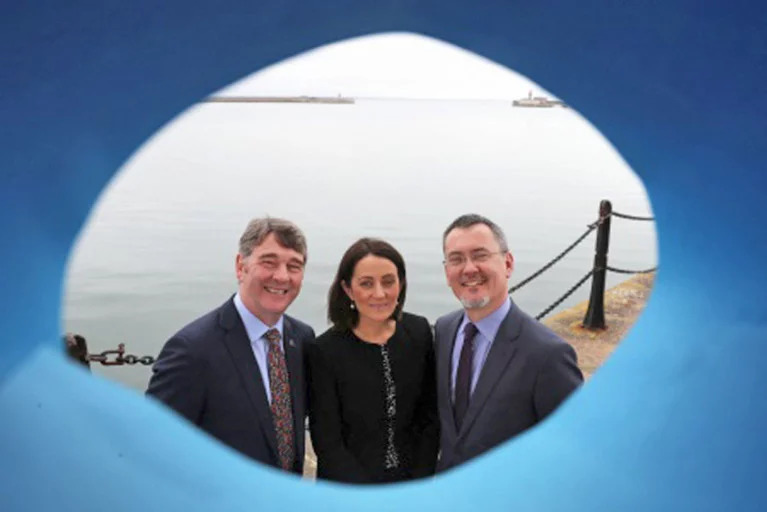 Marine Institute CEO Peter Heffernan, PwC partner Yvonne Thompson and BIM chief Jim O’Toole the launch of the 2018 Our Ocean Wealth Summit
Marine Institute CEO Peter Heffernan, PwC partner Yvonne Thompson and BIM chief Jim O’Toole the launch of the 2018 Our Ocean Wealth Summit
Ahead of SeaFest, enormous opportunities for Irish businesses operating in sectors such as engineering, energy, food and technology to expand their offerings to the marine sector will be discussed at the Our Ocean Wealth Summit in association with PwC at Galway Docks on Thursday 28 and Friday 29 June.
For entrepreneurs, start-ups and businesses interested in finding out more, the summit – under the theme ‘Investing in Marine Ireland’ – includes conference and panel sessions with thought leaders and innovators, as well as a marine trade showcase with exhibits across drone technology, smart shipping, offshore and onshore communications, marine waste management and financial modelling for the marine sector and more.
There will also be ample networking opportunities to connect with national and international businesses, government representatives and speakers from the USA, Europe, UK and Ireland.
#OurOceanWealth - Optimising, commercialising, managing and protecting Ireland’s multi-billion-euro ’blue economy’ is the focus of the 2018 Our Ocean Wealth Summit in Galway on 28-29 June.
Speaking at the launch of the Our Ocean Wealth Summit, this year under the theme ‘Investing in Marine Ireland’, Marine Institute chief executive Peter Heffernan said: “Ireland’s oceans represent enormous commercial opportunities and this summit will be relevant to organisations involved in offshore renewable energy, marine biotech, aquaculture and fisheries, shipping, marine mining and exploration as well as subsea and offshore technology including robotics, communications, sensors and data analytics.
“We are also mindful of the need to manage this incredible blue resource to ensure its viability and health into the future. This year’s summit represents an enormous opportunity to be part of a national and international event where marine leaders will be sharing insights, networking and engaging with delegates over the two days of the summit as part of the national maritime festival, SeaFest.”
This year’s Our Ocean Wealth Summit has attracted high level speakers from across the globe, with Blue Planet producer Orla Doherty and US astronaut and oceanographer Kathryn Sullivan set to join keynote speaker Mary Robinson, former President of Ireland and current chief of the Climate Justice Foundation.
Others include Jose Santos, chairman of the Oceano Azul Foundation (Portugal); Claire Jolly, head of ocean economy at the OECD; and Jill Tully, investment manager with Equinor (Statoil).
Among the Irish leaders that will address the summit on investing in our blue economy and managing the challenges it faces are Marine Minister Michael Creed; PwC partner Yvonne Thompson; Julie Sinnamon of Enterprise Ireland; and Bord Iascaigh Mhara chief executive Jim O’Toole.
The 2018 Our Ocean Wealth Summit has a packed agenda that includes an in-depth discussion on Ireland’s seafood sector and the impact of Brexit; smart shipping, sea and airfreight and logistics for the fishing sector; an interactive session on marine renewables; and insights and thought leadership on climate change.
Marine research and development, maritime commerce, financial planning for the marine and aviation leasing will also be topics discussed at the summit this year.
Speaking at the 2018 launch, Declan McDonald, partner of sponsors PwC, said: “The central theme of investment for the 2018 summit demonstrates how the integrated marine plan for Ireland is moving into a new phase of commercial engagement beyond EU and Government funding.
“We see this theme developing globally with many investment managers and investors actively engaged in funding projects in line with the UN sustainable development goals. We see significant activity in the ocean economy to attract investors seeking returns beyond philanthropy.”
The summit will also include a Marine Ireland Trade Show, where over 60 companies and organisation in the sector will showcase their innovative marine products and services.
Now in its fifth year, the Our Ocean Wealth Summit is supported by a number of partners including PwC, IDA Ireland, Enterprise Ireland, Sustainable Energy Authority of Ireland (SEAI), Science Foundation Ireland, Fáilte Ireland, BIM and the Irish Maritime Development Office (IMDO).
The summit is an output of Harnessing Our Ocean Wealth, the Government’s integrated plan for Ireland's marine sector, which aims to double the value of the marine economy’s contribution to GDP by 2030.
#OurOceanWealth - Former President of Ireland Mary Robinson has been confirmed as keynote speaker for this year’s Our Ocean Wealth Summit, taking place in Galway on Thursday 28 and Friday 29 June.
Now in its fifth year, the Our Ocean Wealth Summit forms a key part of the Government’s integrated marine plan Harnessing Our Ocean Wealth. The summit is a key event for the marine sector and related industries, offering a platform for discussion on the future of Ireland’s marine sector.
This year, the summit will extend across two days with a packed programme of presentations as well as panel discussion, interactive sessions and networking events.
Galway Docks will host the event, expected to attract more than 500 national and international delegates from across the marine sector.
The largest gathering of Ireland’s marine and business communities, the Our Ocean Wealth Summit attracts high-profile speakers from across the globe, not only from the marine sector but from a wide-range of disciplines.
This year’s keynote speaker is Mary Robinson, the seventh President of Ireland and the first woman to hold the office. In 2010 she established The Mary Robinson Foundation – Climate Justice, a centre for thought leadership, education and advocacy on the struggle to secure global justice for people vulnerable to the impacts of climate change.
Other key speakers will include former Nasa astronaut Kathryn Sullivan, who was appointed by US President Barack Obama as Under Secretary of Commerce for Oceans and Atmosphere, and National Oceanic and Atmospheric Association Administrator (NOAA). Sullivan has a long career as a distinguished scientist, astronaut and oceanographer.
Producer of BBC’s award-winning Blue Planet II series Orla Doherty is also one of the highlights of the summit programme. With family roots on the Donegal coast, Doherty has had a strong connection to the sea. She is an expert in underwater filming and has filmed scientists at the frontline of ocean discoveries from Indonesia to the Arctic Circle.
This year’s theme is ‘Investing in Marine Ireland’ and the summit will focus on progress towards the Government’s ambitious targets to double the value of the blue economy by 2030.
The diverse programme planned for this year’s Summit reflects strong collaboration between Bord Iascaigh Mhara, Bord Bia, Enterprise Ireland, IDA Ireland, Fáilte Ireland, Science Foundation Ireland, Marine Institute and the Sustainable Energy Authority Ireland, with individual sessions addressing environmental, economic and societal opportunities and challenges to creating a sustainable ocean economy for Ireland.
The Our Ocean World Summit coincides with Ireland’s national maritime festival, SeaFest 2018 in Galway from Friday 29 June till Sunday 1 July.
Irish Wildlife Trust Warns Of Extinction Threat For Marine Species
#MarineWildlife - Basking sharks, stingrays and seaweeds are among nearly 50 species of marine flora and fauna faced with extinction in Ireland’s waters, according to a new report from the Irish Wildlife Trust (IWT).
Protecting Our Ocean Wealth outlines the current conservation status of 48 species considered most vulnerable due to a lack of comprehensive legislation to protect their habitats.
The IWT report proposes a number of measures that could assist in conversation, including new legal protections for certain species sought after in sport angling, and the closing of the crawfish fishery in Tralee Bay to help restore an “entire ecosystem”.
But as The Irish Times reports, it’s feared that a number of species, including halibut, wolf-fish and the common sturgeon, may already have vanished from Irish waters. More on the story HERE.
2017 a Successful Year of Increasing Ocean Literacy in Irish Primary Schools
#MarineScience - Delivered by ten centres around Ireland is The Explorers Education Programme, that met up to 15,000 primary school students, worked with over 500 school teachers and trained in excess of 100 teachers and student teachers on the east and west coasts.
In addition the Programme generated attendance from several public events reaching over 300,000 people throughout the country in 2017.
Dr Peter Heffernan, CEO, Marine Institute congratulated the centres representing the Explorers Education Programme on their delivery and supporting the Governments national marine strategy Harnessing Our Ocean Wealth, "where one of its goals is to increase Ireland's engagement with the sea. A wave of ocean literacy has hit our shores this year, and it has been incredible to see the Explorers programme go from strength to strength over the last ten years from where we started with ten schools and now are reaching 500 around the country this year. The positive feedback from the teachers and their wider communities about student's eagerness to learn about the ocean reinforces the importance of reaching out to primary schools to help build our marine science capital."
As part of the Explorers Programme interactive marine based modules are introduced in classes that include aquariums in the class, seashore safari's, and a range of marine based projects learning about marine biodiversity, marine environmental awareness and care, marine history as well as marine technology. "Over the last year we have worked with teachers assessing the level of awareness, engagement, and ocean literacy in the classroom and have seen a significant increase in the student's knowledge about the ocean around them," explained Cushla Dromgool-Regan at the Marine Institute.
"The Explorer centres midyear results showed an increase from 59% to 85% in primary school children's knowledge about the ocean nationally, which was amazing, and is a great reflection on the team of outreach officers who are visiting the schools. We are very proud to have supported the Explorers outreach centres around the country who have reached a record number of participants this year" added Cushla Dromgool-Regan.
The Explorers Education Programme aims to help promote learning and increasing our knowledge about the ocean in our communities. "At a national level the Explorers Education Programme has been recognised by teachers and schools as delivering a programme of high impact where students learn about ocean through cross curricular activities ranging from the arts to the sciences. Often the Explorer programme brings out new ideas and team work amongst the students that teachers also get inspiration from," explained Dr Noirin Burke, Galway Atlantaquaria.
The Explorers modules and resources are used to support teachers in achieving their curriculum objectives and can also help schools develop strategies for teaching sustainability topics and hands-on inquiry based lessons which are inclusive of all students needs in the classroom " Dr Noirin Burke further added.
The Explorers Education Programme is supported by the Marine Institute, and is funded under the Marine Research Programme by the Irish Government and is available for schools to take part in throughout a number of coastal counties in Ireland. For more information please visit www.explorers.ie
Foreshore Lease Approved For Galway Bay Marine Energy Test Site
#GalwayBay - In a major boost for the marine energy sector, the Government has approved a 35-year foreshore lease for an upgraded test site in Galway Bay off Spiddal.
Galway Bay FM reports on yesterday’s (Tuesday 19 December) announcement that paves the way for a quarter-scale renewable energy testing facility for wind and wave devices to be established on the site, which has been used to test new technology since 2006 and which is expected to further the aims of the Harnessing Our Ocean Wealth Strategy.
In a nod to local concerns over the project — which received more than 500 submissions in a public consultation last year — the site will be restricted to hosting a single floating wind energy device at ant given time, among other conditions.
Galway Bay FM has more on the story HERE.
€108,000 Awarded To Early-Stage Marine Researchers
#MarineScience - The Marine Institute awarded €108,000 in grant-aid funding to 94 recipients in 2017 under its Networking & Travel Awards.
This scheme, funded under the Marine Research Programme with the support of the Government, makes awards to provide assistance for networking activities that support the goals of the Harnessing Our Ocean Wealth Strategy.
They also constitute an important part of the implementation of the National Marine Research and Innovation Strategy 2017-2021, which was launched in June this year.
The main focus of the Networking & Travel Awards is to give early-stage researchers, post-graduate students, research assistants and intern staff an opportunity to present their marine research to an international audience, network with international marine experts, and promote research carried out in Ireland on the global stage.
Seventy-seven applicants received travel awards for this purpose. A further nine awards were made in support of hosting marine conferences or workshops in Ireland and for the establishment of international networks for leveraging marine funding.
A final eight awards were for the mobility of research expertise by SMEs for the transfer of knowledge in science and technology towards the development of the marine sector.
Since 2014, 41 participating Irish marine organisations have successfully partnered in 77 marine-related EU projects, bringing a minimum of €29.7 million in EU grant-aid to Ireland.
This represents 7% of the total available drawdown for Ireland for a range of research, development and innovation projects.
Next year’s call for the Marine Institute Networking & Travel Awards will open a month from now in mid-January.
National Marine Research & Innovation Strategy Launched
#MarineScience - The new National Marine Research & Innovation Strategy 2017-2021 aims to fulfil the need for a strategic marine research agenda to promote cross-agency collaboration, says Ireland’s Marine Minister.
Michael Creed welcomed the new strategy during SeaFest 2017, Ireland’s national maritime festival, at the Our Ocean Wealth Summit last Friday (30 June) — at which it was announced that Ireland’s ‘blue economy’ is outperforming the general economy, as previously reported on Afloat.ie.
The strategy was prepared by the Marine Institute on behalf of the Marine Coordination Group, and supports the implementation of Innovation 2020, Ireland’s national Research and Innovation Strategy, which identifies the marine sector as one of eight areas of focus for social progress and the economy.
“This new strategy follows on from Sea Change, the last national marine research strategy published in 2007, and will help ensure that Ireland maintains its position at the forefront of marine research in Europe,” said Marine Institute chief executive Dr Peter Heffernan.
“This strategy will ensure that the outputs of new research and innovation will support Ireland’s quest to generate real socio-economic benefits by reaching the 2020 target of a €6.4 billion ocean economy in a sustainable manner.”
The strategy provides a framework for research funders to assess the impact and likely return to the State from research investment in marine related research themes.
It is also designed to ensure that State support of marine research results in Irish researchers being able to compete at an international level and participate fully in transnational research projects.
Preparation of the strategy included a review of national and international marine related strategies and plans, which identified 15 broad research themes such as energy, transport, biodiversity and bioresources.
Each of these themes were the subject of a detailed review of the research capability in Ireland and the steps required to raise this to meet research requirements of national strategies such as Food Harvest 2025 and the Energy White Paper ‘Ireland’s Transition to a Low Carbon Energy Future 2015-2030’.
Welcoming the publication of the strategy on behalf of the board of the Marine Institute, chair John Killeen said: “We look forward to it informing the institute’s own investments, including our plans to co-fund with other Government agencies and departments on projects in a range of marine related research disciplines.”
The launch of the National Marine Research & Innovation Strategy 2017-2021 at the Our Ocean Wealth Summit was accompanied by the publication of New Connections III (2014-2016), which records the success of the Irish marine research community in competitive EU funded programmes such as Horizon 2020, INTERREG-V and ERASMUS+.
#BlueEconomy - The ‘blue economy’ is outperforming Ireland’s general economy, according to Galway’s Socio-Economic Marine Research Unit.
Figures from the fourth SEMRU report released for the Our Ocean Wealth Summit on Friday (30 June) show that the direct economic value of Ireland’s ocean economy was €1.8 billon, or around 0.9% of GDP in 2016 - a 20% increase on 2014 levels.
The ‘blue economy’ also provided jobs for more than 30,000 people in 2016, the report noted.
Marine Institute chief executive Dr Peter Heffernan welcomed SEMRU’s findings during Friday’s summit at NUI Galway as part of SeaFest 2017.
“Investment in research for Ireland’s marine sector has been essential in shaping the strategic development of our blue economy,” he said. “These timely marine economic statistics are vital for evidence-based policy and decision making.
“It’s very encouraging to see that established sectors are performing so well, and that emerging sectors such as those providing advanced marine technology products and services, and renewable energy, are experiencing rapid growth in Ireland's ocean economy.”
Dr Heffernan added: “The ambition set out in the Harnessing Our Ocean Wealth Strategy is to achieve a €6.4 billion ocean economy by 2020 and to do this in a sustainable manner requires joined up thinking and close collaboration between agencies and organisations driving innovation, progress and success in our marine sector.
“The SEMRU reports are a key component of Ireland's marine strategy which requires comprehensive and targeted surveys and reporting, so that we can benchmark the marine sector with other sectors, monitor progress and performance and create a better understanding of the dynamics of the marine sector.”
Friday also saw the launch of Ireland’s National Marine Research & Innovation Strategy by Marine Minister Michael Creed. The new plan, which covers 2017 to 2021, was welcomed by Marine Institute chair Dr John Killeen.
“The Marine Institute, as the national agency for marine research and development, was pleased to co-ordinate the development of this strategy,” he said. “We look forward to it informing the Institute's investments, including our plans to co-fund with other government agencies and departments on projects in a range of marine related research disciplines.”
The Harnessing Our Ocean Wealth Progress Report 2017 was also published at the summit, which took place as part of SeaFest, the national maritime festival, which concludes today (Sunday 2 July) in Galway.
Taoiseach Leo Varadkar attended events in the City of the Tribes yesterday (Saturday 1 July), greeting festival goers as he explored the activities and entertainment at Galway Harbour and Docks.
This included tours of scientific vessels like the RV Celtic Explorer, and seeing local boatbuilders’ demonstration of their craft.
#OurOceanWealth - Maritime Alliance executive director Greg Murphy will provide insights into the success of the US ‘blue tech’ cluster for the Irish marine sector in his keynote address at the Our Ocean Wealth Summit later this month.
Murphy heads a list of speakers announced to coincide with World Oceans Day (Thursday 8 June) for the summit on Friday 30 June at NUI Galway, which will focus on the theme of ‘Rethinking Boundaries and Innovation for a Sustainable Marine Economy’ and where delegates will also receive a progress update on Ireland’s Integrated Marine Plan - Harnessing Our Ocean Wealth.
Terry Garcia, principal at Exploration Ventures LLC and former chief science and exploration officer at National Geographic, will lead discussions on the overwhelming and urgent imperative to innovate arising from our changing oceans.
Bringing Ireland’s blue economy into focus, Dan O'Brien, chief economist for the Institute of International and European Affairs, is addressing a number of topics from the Irish seafood sector, sustainability and economic development in coastal regions to the impact of the Wild Atlantic Way coastal tourism initiative.
Also on the speaker list are representatives from GEOMAR, PwC and Statoil as well as national speakers and panellists including Bord Bia CEO Tara McCarthy and Fáilte Ireland’s head of the Wild Atlantic Way programme, Fiona Monaghan, among others.
They join previously announced innovation expert Tom Kelley, of award-winning global design and development firm IDEO, who will address the summit on encouraging leaders in Ireland’s marine sector to engage in creative thinking.
Moderated by broadcaster and journalist Olivia O’Leary, this year’s Our Ocean Wealth Summit offers a platform for global and national leaders from across the marine industry and related sectors to convene and collaborate on innovating for our marine future.
“Our ocean is a national asset and supports a diverse economy,” says Marine Institute chief executive Dr Peter Heffernan said. “There are many success stories from businesses, from a range of sectors, about how they have responded to the opportunities provided by the ocean.
“To enable our marine potential to be realised, it is essential that we seek new approaches and ways of thinking to harness the boundless opportunities that exist in our marine industry.
“At this year's summit, delegates will be inspired by those leading the way in driving innovation to continue developing a sustainable marine economy for Ireland.”
A number of related marine industry and research events will also be held around the summit on Thursday 29 and Friday 30 June, including the Digital Ocean Conference and the Marine Trade Show.
The Our Ocean Wealth Summit sponsored by PwC and related events are held as part of SeaFest 2017, Ireland’s national maritime festival, from 30 June to 2 July in Galway. For the full summit programme and to register visit www.ouroceanwealth.ie/register


























